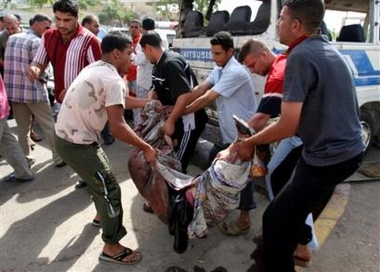A string of explosions ripped through the Iraqi capital
Sunday, killing at least 12 people, including a woman and two children on a bus.
Shiites condemned the bombing a day earlier of six Shiite shrines around the
volatile city of Baqouba.

Iraqis carry the body of one of the victims of
a roadside bomb attack that missed a police patrol, but hit a civilian bus
in Baghdad, Sunday, May 14, 2006. Five roadside bombs and two suicide car
bombs exploded one after another in Baghdad on Sunday morning, killing a
total of 12 Iraqis and wounding 37, police said.
[AP] |
The shrine attacks could have significant repercussions, particularly in the
Baqouba area, a mixed Sunni Arab-Shiite region where sectarian tensions are
running high. It was the second time this year that sites sacred to Iraq's
Shiite majority have been targeted.
"These are terrorist attacks meant to divide Iraq's Shiites and Sunni Arabs,
but if God is willing, they will not succeed," said Mohammed Hussein, 45, a
businessman in Baqouba, 35 miles northeast of Baghdad.
In Baghdad, the first two roadside bomb exploded 30 minutes apart in separate
areas of Palestine Street, a main thoroughfare in eastern Baghdad.
The first hit a police patrol, wounding two policemen and four bystanders,
police said. The second missed a police patrol but hit a civilian bus, killing
five people, including a woman and two children, and wounding a police officer.
A police patrol hit a roadside bomb in Baghdad's northern district of
Azamiyah, killing three policeman and wounding 10 bystanders and three
policemen, police said. Another roadside bomb missed a police patrol in central
Baghdad, but wounded seven civilians.
Four civilians were killed in a roadside bomb explosion in an open market for
vegetables and household products in southeastern Baghdad, police said. Sixteen
people were wounded.
Two suicide car bombs exploded near a U.S. convoy at a checkpoint on
Baghdad's airport road, wounding 18 Iraqis, six civilians and 12 security
personnel, said police Capt. Jamil Hussein. U.S. forces immediately closed off
the area, and no casualties were immediately reported among the Americans.
In the Baqouba area, the bombs heavily damaged two of the small shrines but
caused no injuries. Late Saturday, bombs hidden in a cemetery surrounding the
Imam Jabir bin Ali al-Hadi shrine were set off by remote control, leveling the
building in Muqdadiyah, about 13 miles east of Baquoba, said Lt. Col. Falah
al-Mohammedawi a provincial police officer.
That morning, at least one bombs hidden inside the Tameem shrine exploded in
a village about 3 miles west of the al-Hadi shrine, said Lt. Col. Barry Johnson,
a U.S. military spokesman. Police said the blast destroyed about 80 of the
building.
The other shrines hit were the Abdullah bin ali Hadi, the Prophet Sinyar, the
Prophet Fityan and the Imam abu al-Hadid ¡ª all located near Baqouba.
On Feb. 22, bombs heavily damaged the Golden Dome in Samarra, which holds the
tomb of Imam Jabir's grandfather. That attack triggered a wave of reprisal
attacks against Sunnis, dramatically escalating sectarian tension and pushing
the country to the brink of civil war.
"Such acts anger God and hurt the feeling of all honest Iraqis," Shiite
cleric Adnan al-Rubaie said in a telephone interview from Baqouba. "The goal is
clear ¡ª to ignite a civil strife. God's curse on everybody who tries to create
sedition in this country."